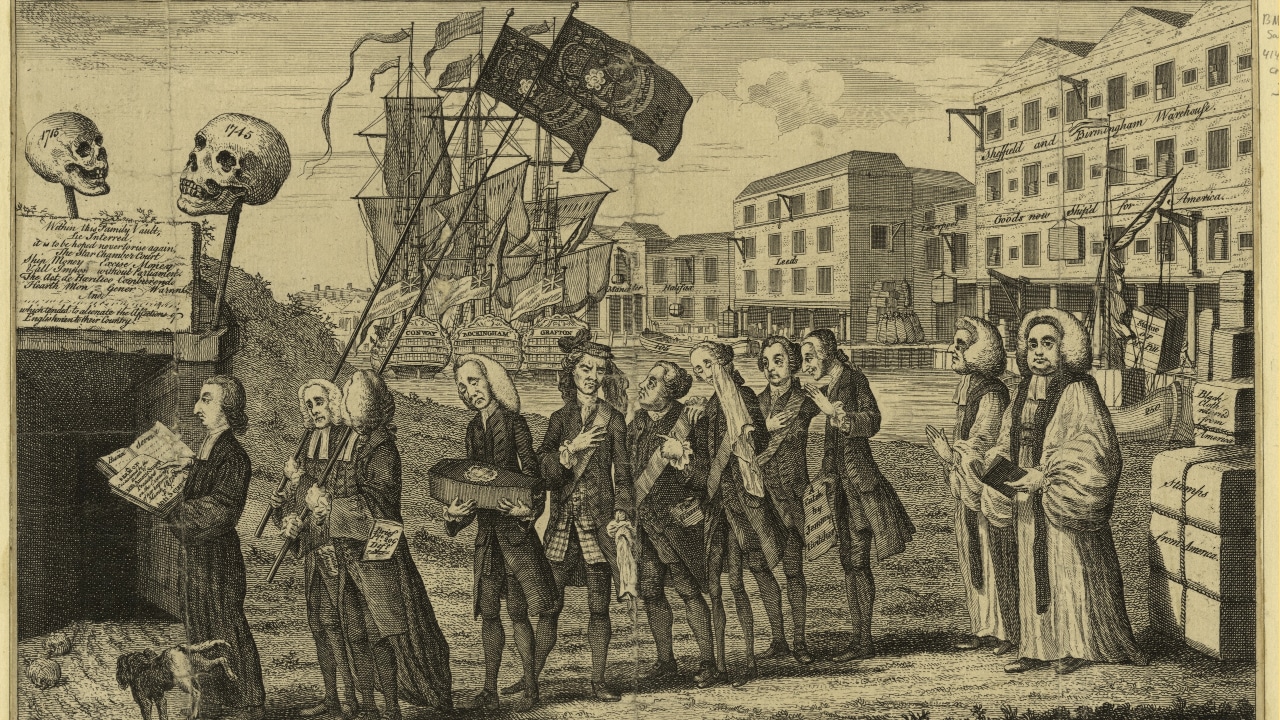In school, you probably learned that the American Revolution was about “taxation without representation,” or perhaps standing armies. But this doesn’t tell the whole story, not even close – especially if we listen to what the Founders and Old Revolutionaries had to say.
In short, these were symptoms of a deeper problem – unlimited centralized government power.
In early 1766, the colonists effectively nullified the Stamp Act, forcing Parliament to repeal the hated law. But there was a caveat. At the same time, Parliament also passed the Declaratory Act, asserting that it could make laws binding the American colonies “in all cases whatsoever.”
It was a claim of absolute and unlimited, centralized authority.
In other words, the root cause of the “controversy between the colonies and Great Britain” was about sovereignty – who has ultimate and final authority.
In the British system, the “King in Parliament” was considered sovereign. In effect, Parliament wielded final authority with the king serving as the arm to put its power into action. Massachusetts royal governor Sir Francis Bernard went as far as to say “The King in Parliament has the sole right of legislation, and the supreme superintendency of the government; and, in this plentitude of power, is absolute, uncontrollable, and accountable to none; and therefore in a political sense, can do no wrong”
Influenced by the writings of John Locke, Algernon Sidney, and other thinkers, the founders and old revolutionaries began to form a very different conception of government. They came to believe the people are sovereign and government is constrained by their will.
Two groups of people holding such radically divergent views of sovereignty were bound to clash.
Many of the leading figures during the revolutionary era asserted that the Declaratory Act was the root of the conflict.
For example, in his Massacre Day Oration on March 5, 1774, John Hancock explained that “taxation without representation” was merely an outgrowth of that act.
“They have declared that they have, ever had, and of right ought ever to have, full power to make laws of sufficient validity to bind the colonies in all cases whatever: They have exercised this pretended right by imposing a tax upon us without our consent”
Alexander Hamilton made a similar point that same year.
“The parliament claims a right to tax us in all cases whatsoever: Its late acts are in virtue of that claim. How ridiculous then is it to affirm, that we are quarreling for the trifling sum of three pence a pound on tea; when it is evidently the principle against which we contend.”
The first paragraph of the Declaration and Resolves of the First Continental Congress passed on Oct. 14, 1774, in response to the Coercive Acts also cited the Declaratory Act of 1766 and asserted that everything happening was an outgrowth of that claim to unlimited power.
“Whereas, since the close of the last war, the British parliament, claiming a power, of right, to bind the people of America by statutes in all cases whatsoever, hath, in some acts, expressly imposed taxes on them, and in others, under various presences, but in fact for the purpose of raising a revenue, hath imposed rates and duties payable in these colonies, established a board of commissioners, with unconstitutional powers, and extended the jurisdiction of courts of admiralty, not only for collecting the said duties, but for the trial of causes merely arising within the body of a county.”
In the Declaration of Causes and Necessity of Taking Up Arms passed unanimously by the Second Continental Congress in July 1775, Thomas Jefferson and John Dickinson again specifically addressed the British claim to absolute power.
“But why should we enumerate our injuries in detail? By one statute it is declared that Parliament can ‘of right make laws to bind us in all cases whatsoever.’ What is to defend us against so enormous, so unlimited a power?”
In the very first line of the South Carolina Constitution, ratified two months before the Declaration of Independence, the very first line called out the unlimited power claimed by Parliament’s Declaratory Act.
“Whereas the British Parliament, claiming of late years a right to bind the North American colonies by law in all cases whatsoever, have enacted statutes for raising a revenue in those colonies and disposing of such revenue as they thought proper, without the consent and against the will of the colonists.”
In his famous tract American Crisis published on December 23, 1776, Thomas Paine asserted that the British claim to unlimited power was effectively slavery – and that’s why the American revolutionaries needed to push on against all odds.
“Britain, with an army to enforce her tyranny, has declared that she has a right (not only to TAX) but ‘to BIND us in ALL CASES WHATSOEVER’ and if being bound in that manner, is not slavery, then is there not such a thing as slavery upon earth. Even the expression is impious; for so unlimited a power can belong only to God.”
In a 1777 letter to Susanna Philipse Robinson, John Jay also called people living under such sweeping power “slaves.”
“For who are Slaves but those, who in all Cases without Exception are bound to obey the uncontroulable Mandates of a Man—whether stiled King or called Peasant.”
Over and over again, the old revolutionaries railed against this claim of unlimited, centralized power. They rejected it and they were willing to put it all on the line to stop it.



